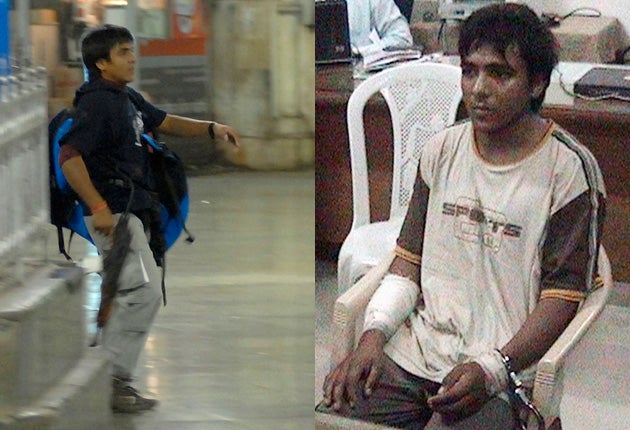Sole surviving Mumbai gunman must hang, say prosecutors
Pakistan warned 'not to export terrorism' as court finds militant guilty of 86 charges

Prosecutors will today make their case that Ajmal Kasab, the young Pakistani militant notoriously captured on film during the Mumbai attacks, should be put to death after a court found him guilty of 86 charges relating to the assault on the city.
Prosecutors have said they believe the sole surviving militant from the group of 10 Pakistani gunmen who carried out the attacks that left more than 160 people dead, should be hanged.
"It was not a simple act of murder. It was war," trial judge M L Tahiliyani, said in a summary of the 1,522-page judgment. "This type of preparation is not made by ordinary criminals. This type of preparation is made by those waging war."
The attacks, in November 2008, considered by India to be its equivalent of the assault on the US on 11 September 2001, triggered a rapid worsening of relations between India and Pakistan, with formal peace talks put on hold. They also underlined the sheer vulnerability of Indian cities and the inadequacy of their security in the face of an attack carried by determined, trained gunmen.
The siege prompted calls for a wholesale restructuring in the country's poorly trained and under-funded security forces, though few major changes ever took place. Targeting, as they did, many high-profile, luxury establishments such as the Taj Mahal Palace hotel, the militants also inspired fear among the wealthy and élite segment of Indian society.
While the 60-hour assault only paralysed a part of Mumbai, the shockwaves of the attack, broadcast live on television, were felt around the world.
During the attack on India's financial capital, 22-year-old Kasab, from a village in the south of Pakistan's Punjab province, was caught on film as he walked through the city's main train station. The jarring contrast between the militant's babyface looks and the AK-47 automatic rifle he was carrying made an iconic, if notorious image. At least 60 people were killed at the station alone, with many more badly injured.
Having initially admitted his role in the assault only to later withdraw his testimony, Kasab yesterday did not appear to react as the verdict was read to him by the judge. "The judgment itself is a message to Pakistan that they should not export terrorism to India," India's Home Minister, Palaniappan Chidambaram, later told reporters.
Pakistan's Interior Minister, Rehman Malik, said: "We will respect the Indian court verdict ... When the full verdict comes we will see and then give a formal reaction."
India has said that the attacks were planned and carried out by the banned, Pakistan-based militant group Lashkar-e-Taiba (LeT) and has demanded the authorities in Islamabad take action, especially against the organisation's alleged leader, Hafiz Muhammad Saeed.
It has handed Pakistan dossiers containing what it says is evidence that could be used to charge and prosecute Mr Saeed. Islamabad has said there is insufficient evidence for such charges to stick, but points out that alleged members of the LeT are currently being tried over attacks.
India has charged a full 38 people, many of them living in Pakistan. Yesterday 20 of them – including Mr Saeed – were found guilty in absentia by the court. However, in what appeared to be an embarrassment to prosecutors, the court decided that two Indians charged over the attacks were not guilty. The judge questioned much of the evidence brought against the two men.
Some of the relatives of those who died have demanded that Kasab be swiftly put to death, with some suggesting the execution be carried out on the anniversary of the attacks and even broadcast on television.
Deepak Bhonsale, the son of a police inspector killed in the attacks, told reporters: "Although it took more than 17 months to pass a verdict against such a criminal, I am glad we will finally hear the sentence. He has taken the lives of many innocent people. He should be hanged till death."
Though India has the death penalty and is currently holding an estimated 300 prisoners on death row, it has not executed anyone since 2004 when it hanged Dhananjoy Chatterjee, a security guard from Kolkata convicted of raping and murdering a teenage girl.
Recent reports in the local media have even suggested that none of India's jails currently has a hangman, the last executioners having all retired.
Mumbai attacks in numbers
59.5 hours from the first shot fired by the group of terrorists to the end of the siege at the Taj Mahal hotel
271 days Ajmal Kasab's trial lasted – swift by Indian standards
100 commandos used to clear the Taj Mahal hotel
86 charges against Ajmal Kasab. He was found guilty of most of them
600 witnesses called for the trial at a special court in Mumbai
Join our commenting forum
Join thought-provoking conversations, follow other Independent readers and see their replies
Comments
Bookmark popover
Removed from bookmarks